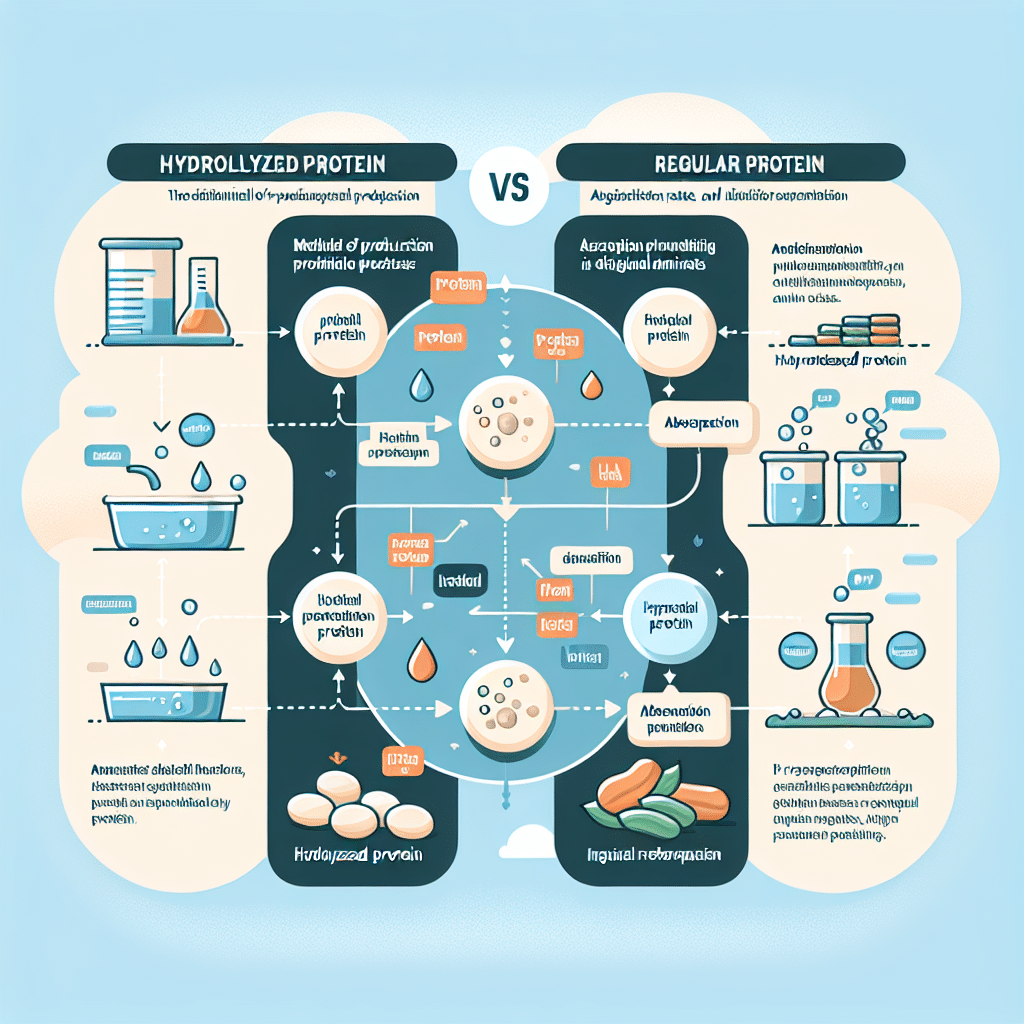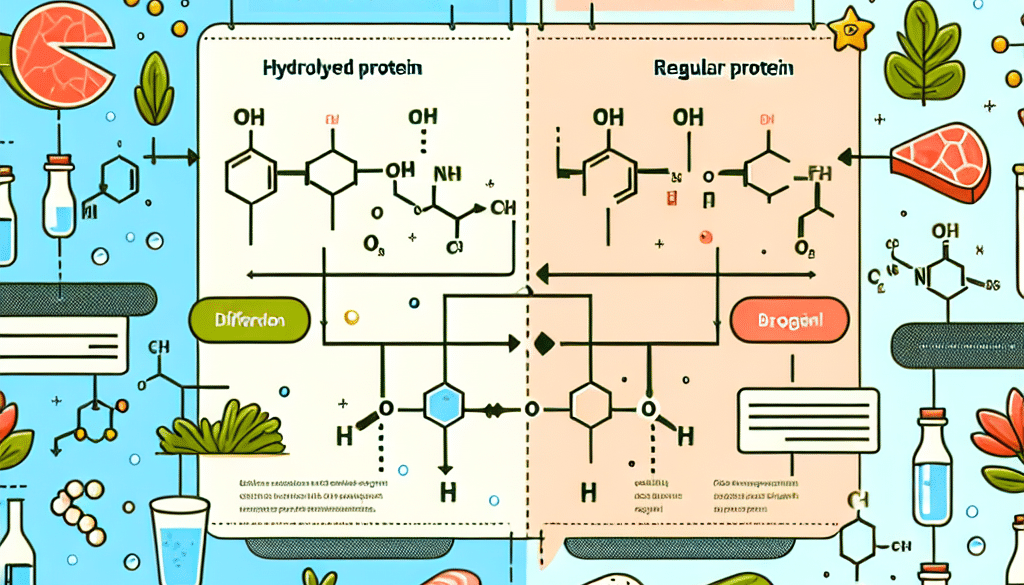What’s The Difference Between Hydrolyzed Protein And Regular Protein? Deep dive
Table of Contents
- Hydrolyzed Protein vs. Regular Protein: Understanding the Differences
- What is Regular Protein?
- What is Hydrolyzed Protein?
- The Hydrolysis Process
- Comparing Digestion and Absorption
- Benefits of Hydrolyzed Protein
- Applications of Hydrolyzed Protein
- Choosing Between Hydrolyzed Protein and Regular Protein
- Conclusion: Key Takeaways
- Discover ETprotein’s High-Quality Protein Products
Hydrolyzed Protein vs. Regular Protein: Understanding the Differences

Proteins are fundamental to our diet, playing a crucial role in building and repairing tissues, making enzymes and hormones, and supporting overall health. However, not all proteins are created equal. The way protein is processed can affect its digestion, absorption, and utility in the body. In this article, we will explore the differences between hydrolyzed protein and regular protein, their benefits, and their applications in various dietary contexts.
What is Regular Protein?
Regular protein refers to protein sources that are consumed in their natural or slightly processed form. These proteins can come from both animal and plant sources, including meat, dairy, eggs, legumes, nuts, and seeds. Regular proteins are made up of long chains of amino acids, which the body must break down into shorter chains or individual amino acids during digestion before they can be absorbed and utilized.
What is Hydrolyzed Protein?
Hydrolyzed protein, on the other hand, is protein that has undergone hydrolysis – a process where water molecules are used to break the peptide bonds linking amino acids. This results in shorter chains of amino acids, known as peptides, or even individual amino acids. Hydrolyzed proteins are often found in protein powders, infant formulas, and medical nutrition products due to their enhanced digestibility and reduced allergenic potential.
The Hydrolysis Process
The hydrolysis process can be achieved through various methods, including enzymatic hydrolysis, where specific enzymes are used to break down the protein, or through acid or alkaline hydrolysis. Enzymatic hydrolysis is preferred for food products because it is more controlled and avoids the use of harsh chemicals.
Comparing Digestion and Absorption
One of the main differences between hydrolyzed protein and regular protein lies in how they are digested and absorbed by the body:
- Regular Protein: Requires more time and energy to digest. The body must break down the long chains of amino acids into shorter ones or individual amino acids before they can be absorbed in the small intestine.
- Hydrolyzed Protein: Due to its pre-digested state, hydrolyzed protein can be absorbed more quickly and with less effort by the digestive system. This can be particularly beneficial for individuals with certain digestive conditions or for athletes who need rapid absorption of amino acids post-exercise.
Benefits of Hydrolyzed Protein
Hydrolyzed proteins offer several benefits over their regular counterparts:
- Enhanced Absorption: The smaller peptides and amino acids are more easily absorbed, which can lead to a faster recovery and muscle repair, especially after intense physical activity.
- Reduced Allergenicity: Hydrolysis can reduce the allergenic potential of certain proteins, making them suitable for individuals with allergies or intolerances.
- Improved Solubility and Stability: Hydrolyzed proteins often dissolve better in liquids and can be more stable in various pH environments, making them ideal for use in beverages and other liquid formulations.
Applications of Hydrolyzed Protein
Hydrolyzed proteins are used in a variety of products:
- Sports Nutrition: They are popular in sports supplements due to their rapid absorption, supporting quick recovery.
- Infant Formula: Hydrolyzed proteins are less likely to cause allergic reactions, making them a safe choice for baby formulas.
- Medical Nutrition: They are used in medical nutrition products for patients with compromised digestion or absorption.
Choosing Between Hydrolyzed Protein and Regular Protein
The choice between hydrolyzed protein and regular protein depends on individual needs and goals:
- Digestive Health: Those with digestive issues may benefit from hydrolyzed protein.
- Performance and Recovery: Athletes looking for quick recovery might prefer hydrolyzed protein supplements.
- Dietary Preferences: Individuals without specific health or performance goals may opt for regular protein sources as part of a balanced diet.
Conclusion: Key Takeaways
In summary, hydrolyzed protein offers enhanced digestibility and absorption, reduced allergenicity, and improved solubility compared to regular protein. While hydrolyzed protein can be beneficial in certain contexts, regular protein sources are sufficient for most people and provide a range of other nutrients. Understanding the differences between these two forms of protein can help consumers make informed dietary choices based on their health needs, dietary preferences, and fitness goals.
Discover ETprotein’s High-Quality Protein Products
If you’re looking for premium protein options, consider ETprotein’s range of products. They offer a variety of organic and hydrolyzed proteins suitable for different dietary requirements and applications. Whether you’re formulating sports nutrition products, developing infant formulas, or seeking allergen-free protein sources, ETprotein has a solution for you.
About ETprotein:
ETprotein, a reputable protein and L-(+)-Ergothioneine (EGT) Chinese factory manufacturer and supplier, is renowned for producing, stocking, exporting, and delivering the highest quality organic bulk vegan proteins and L-(+)-Ergothioneine. They include Organic rice protein, clear rice protein, pea protein, clear pea protein, watermelon seed protein, pumpkin seed protein, sunflower seed protein, mung bean protein, peanut protein, and L-(+)-Ergothioneine EGT Pharmaceutical grade, L-(+)-Ergothioneine EGT food grade, L-(+)-Ergothioneine EGT cosmetic grade, L-(+)-Ergothioneine EGT reference grade and L-(+)-Ergothioneine EGT standard. Their offerings, characterized by a neutral taste, non-GMO, allergen-free attributes, with L-(+)-Ergothioneine purity over 98%, 99%, cater to a diverse range of industries. They serve nutraceutical, pharmaceutical, cosmeceutical, veterinary, as well as food and beverage finished product distributors, traders, and manufacturers across Europe, USA, Canada, Australia, Thailand, Japan, Korea, Brazil, and Chile, among others.
ETprotein specialization includes exporting and delivering tailor-made protein powder and finished nutritional supplements. Their extensive product range covers sectors like Food and Beverage, Sports Nutrition, Weight Management, Dietary Supplements, Health and Wellness Products, and Infant Formula, ensuring comprehensive solutions to meet all your protein needs.
As a trusted company by leading global food and beverage brands and Fortune 500 companies, ETprotein reinforces China’s reputation in the global arena. For more information or to sample their products, please contact them and email sales(at)ETprotein.com today.












